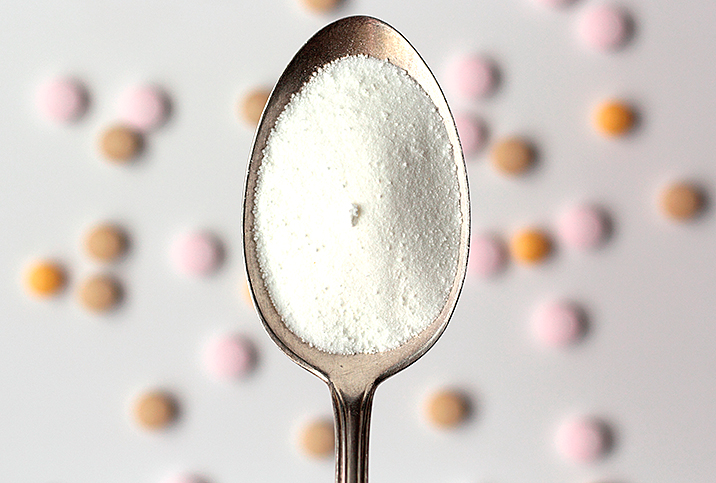This Boost May Be a Bust for Fertility Purposes

Are you and your partner struggling to get pregnant and worried about a fertility issue? Don't take matters into your own hands by loading anyone up on testosterone supplements, thinking they'll help.
They won't—at least not in this situation.
When you think of testosterone, what words come to mind? Hormone? Men? Fertility? Essentially, all of those words make sense. Testosterone is a sex hormone that plays a vital role in controlling libido and sperm production, among other functions, such as regulating muscle mass and bone density.
This is where the confusion comes in. It's easy to think that if you have a fertility problem, taking testosterone could help, but it's not the case.
"While it is well known that testosterone is the hormone that stimulates sperm production in men, the lesser known but essential caveat is that for sperm production to occur, this testosterone needs to be made internally in a man's testicles rather than externally supplied," explained Michael Werner, M.D., the medical director and founder of Maze Men's Sexual & Reproductive Health, based in Purchase, New York, and New York City.
Read on to discover the problem with testosterone supplements for fertility and how they cause more harm than good.
The mechanism of testosterone and sperm production
Werner explained that sperm and a majority of a man's testosterone are produced in the testicles. For a man to produce sperm, there must be a very high testosterone concentration in the testicles, but this happens only when the testosterone is produced in the testicles themselves.
"The testicles make a high concentration of testosterone, which then goes into the bloodstream and has its effects on the other tissues of the body," Werner said. "Despite testosterone's global effect, the testicles have the body's highest testosterone concentration by far."
He said another part of the body involved in sperm production is the pituitary gland, a pea-sized gland at the base of the brain that is responsible for regulating the production of multiple hormones.
"One of the hormones it makes is called luteinizing hormone, which stimulates the testicles to produce testosterone," he said.
This brings us to the critical point: If the testosterone in the body helps produce sperm, then why doesn't a testosterone supplement accomplish the same task?
The misunderstanding about testosterone and fertility
"There is a widespread misconception that testosterone supplements are beneficial for fertility," said Jennifer Knudtson, M.D., a reproductive endocrinologist with Aspire Fertility San Antonio. "We see testosterone as a male hormone linked with sperm production, but there is a misunderstanding as to how it is involved."
Knudtson explained that there are two different types of testosterone. Endogenous testosterone is naturally made in the body. Exogenous testosterone is the supplemental form.
"If a man uses a testosterone supplement, this sends a signal to the pituitary gland that there is enough testosterone in the bloodstream," Werner said. "The pituitary gland then shuts down the production of luteinizing hormone so that the testicles stop producing testosterone themselves."
'When you take testosterone supplements, it prevents the signaling needed in the body to produce sperm and, therefore, decreases sperm production.'
If the testicles are not making testosterone, then the testosterone concentration in the testicles drops dramatically. This drop in testicular testosterone levels happens even if there are good testosterone levels in the bloodstream from external sources, such as supplements. When the concentration of testosterone in the testicles declines, sperm production declines accordingly.
"When you take testosterone supplements, it prevents the signaling needed in the body to produce sperm and, therefore, decreases sperm production," Knudtson said. "I have even seen couples where the male has no sperm at all after taking testosterone."
The problem with supplements
Okay, so testosterone supplements can actually reduce sperm production, which can be detrimental to fertility. The potential problems with testosterone supplements do not stop there, however.
According to Werner, many "testosterone boosting" supplements are, in fact, nothing of the kind, because dietary and sexual health supplements are not required to go through the same rigorous testing process as prescription medications. Some of these supplements may not have testosterone or testosterone boosters in them at all. He pointed to boosters that include tribulus, an herb that can mimic testosterone and actually lower a man's sperm production.
Bearing all this information in mind, what is the best way to stimulate sperm production if you have low testosterone levels and testosterone supplements are harmful?
Alternatives and remedies
If a man has low testosterone but still wants to preserve sperm production, Knudtson advised that a good diet and healthy lifestyle are positive steps. But she said the most crucial step is to speak to a fertility specialist.
"If you see a reproductive endocrinologist, they will analyze your sperm to get a better understanding of any sperm production problems," she said. "They can work alongside a fertility urologist to prescribe medications that boost testosterone production in the body."
Werner explained that two primary medications can increase a man's own production of testosterone in the testicles:
- Clomiphene citrate: This pill, usually taken every other day, pushes the pituitary gland to make more luteinizing hormone, which then stimulates the testes to produce more testosterone and can increase sperm production.
- Human chorionic gonadotropin (hCG): This injection, administered three times a week in the fat below the skin, is similar to an allergy shot. It directly mimics luteinizing hormone and similarly pushes the testes to make more testosterone.
A fertility urologist can also prescribe these medications to help men with low sperm production secondary to taking testosterone supplements.
The reduction of sperm production—or in severe cases, the cessation of sperm production—can sometimes be reversed, but not always, Knudtson said.
"If a male of reproductive age is considering taking testosterone, I would advise them to please speak to a medical professional before doing so," she said.
This advice was reiterated by Werner, who stressed that testosterone levels can be increased and improved without harming sperm production.
"A urologist specializing in male infertility can guide a man on which treatment is best and help monitor his symptoms and health parameters throughout any treatment," he said.


















